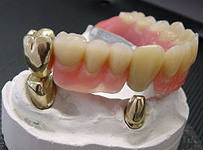Telescopic prosthetics
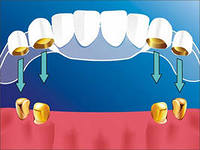
Telescopic removable dentures are the most comfortable type of modern removable dentures.
Of all the castle structures, a dental prosthesis on telescopic crowns is the most reliable. Telescopic prostheses got this name due to the fact that the docking of the components of the structure has the principle of the structure of a telescope. Designs with telescopic fixation can be placed both with support on the teeth and on implants.
Telescopic prostheses are a great choice for the elderly. The designs are convenient to use and can be corrected in case of loss of other teeth. A removable prosthesis with telescopic fixation can replace a large number of lost teeth.
Manufacturing designs on telescopic crowns is a laborious process. For its high-quality manufacturing, a highly qualified dental technician, instruments and materials are required in the clinic. The slightest deviations in the construction technology or the use of low-quality material can very negatively affect the result.
How is the prosthesis arranged?
Removable prostheses on telescopic crowns consist of two parts:

- Fixed part of the structure. This is a cap made of metal, which is thoroughly fixed to the abutment. Outwardly, he looks like a thimble. Attaches to the abutment using cement or implant-based.
- The removable part of the structure is the prosthesis itself. It can be a clasp or a bridge. The ceramic-metal crown is tightly mounted in it.
When putting on a removable part on a non-removable, a strong and reliable fixation of the prosthesis occurs.
The modern telescopic design allows you to reliably fix the removable part of the denture on the abutment teeth, and if necessary, the prosthesis can be easily removed.
There are two types of crowns for telescoping prosthesis fixation:
- Conical.
- Cylindrical.
Cone crowns are less sensitive to manufacturing errors and wear.
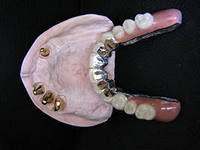
The more pronounced the conicity of the crowns, the less effort is required to separate them. Cone crowns are not capable of
jamming and skewing. The disadvantage of poor adhesion may be that they can easily separate from sticky food or tongue.
The use of cone crowns is indicated in all cases of the use of removable prostheses.
Cylindrical crowns have parallel walls that slide against each other and hardly provide traction. They are used only on teeth with an intact periodontium.
Due to the complexity of manufacturing, such designs are used very rarely.
Materials for dental prostheses on telescopic crowns
Removable prostheses with a telescopic fixation system are made of special dental alloys.
- The removable and non-removable parts of the structure are made of the same alloy, if possible.
- The alloys used to make prostheses are hypoallergenic and safe for health. They do not oxidize in the oral cavity.
- Alternative to gold crowns are base metal alloys. When making a prosthesis from gold, the design is more accurate, but at the same time expensive.
- A more rational solution in technical terms is galvanic technology. Thus, the main part can be made of zirconium dioxide or an alloy of base metals, and the outer part of gilding. This method is high-tech.
Indications for installation
Telescopic prosthetics has the following indications:
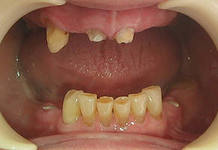
- Few real teeth.
- The patient's desire to have teeth that are no different from real ones.
- Unreliability of the remaining teeth, when there is a high probability that these teeth will be lost.
- The patient wants the structure to be firmly fixed in the mouth.
Pros and Cons of Telescopic Dentures
Advantages of dentures on telescopic crowns:
- The interdental spaces are quite accessible with the prosthesis removed, which makes it possible to carry out full hygienic dental care.
- With further loss of teeth, the design can be transformed.
- Hold firmly in your mouth.
- High esthetics. The prosthesis is invisible to others.
- Structural strength.
- Chewing pressure is distributed to the abutment teeth, which favorably affects the periodontium.
- Do not affect diction.
Disadvantages of telescopic dental structures:
- The need for a large space due to double dental crowns.
- Very expensive.
Prices for telescopic dentures
The cost of telescopic dentures depends on the material from which the teeth are made, as well as on the number of teeth on which the structure will be fixed. The high construction cost is explained by the fact that two crowns are made for each tooth.
The cost of telescopic removable dentures:
| Type of prosthesis | Price, rub.) |
| Telescopic crown, (1 unit) | 21000 |
| Clasp telescopic prosthesis, (1 unit) | 22000 |
Life time
Dentures telescopes have a lifespan of three to ten years.
In the process of structure wear - after about 3 to 4 years, telescopic crowns lose traction and become loose.
To extend the life of the crowns, it is necessary to use the prosthesis correctly, undergo a regular examination at the dentist and conduct timely correction of telescopic prostheses.
Care
Rules for caring for removable dentures on telescopic crowns:
- You can use the design around the clock.
- It is only necessary to remove the prosthesis in order to carry out its hygienic treatment.
- Do not put the structure overnight in a glass of water.
- Removing and installing the prosthesis must be done in front of the sink, putting a soft towel in it. In order to prevent damage to the prosthesis in the event of a fall.
- Remove and put on the structure in front of the mirror.
- Be sure to undergo a professional examination, as This type of prosthesis needs to be monitored by a specialist.
Alternatives
The choice of prosthetics is always a difficult task for the patient. Therefore, the patient should be aware of alternative types of dental prosthetics.
- Dental implantation. A great alternative to any kind of removable prosthetics.
- Removable structures lose to prostheses on telescopic crowns in fixing methods and comfortable use. Sometimes, the installation of removable dentures requires tooth extraction.
- Nylon dental designs are inferior to dentures on telescopic crowns in the period of use. If a tooth loss occurs under the structure, it is not possible to repair dentures made of nylon.
- Clasp dental designs with micro-locks are a good alternative to telescopic removable dentures. But they cannot be made with a small number of teeth in a patient.
Reviews
- Clasp dentures on telescopic crowns have been placed on me. I am very pleased with them. They are not visible to others, and I quickly got used to them. (Irina Petrovna, Voronezh)
- I wore an acrylic prosthesis for three years - it was terribly uncomfortable, especially with meals. With a telescopic prosthesis I feel young and confident! I even forget about its existence. (Olga Vladimirovna, Moscow)
- Finally, I got the opportunity to smile! I am very pleased with the prosthesis with telescopic crowns, although I was not used to it immediately. (Ivan Dmitrievich, Krasnoyarsk)
- I thought that the process of installing a telescopic removable denture would take a very long time. It turned out - this is not so. The work was done very quickly. Very pleased with the dental design. (Boris Petrovich, Perm)
FAQ
- Question: How much does it cost to install a telescopic prosthesis if only 4 teeth are left?
Answer: The cost of one telescopic crown is approximately 21,000 rubles. For 4 teeth you will need to make 8 crowns. Consequently, the price of the prosthesis will be 168,000 rubles.
- Question: How is a removable clasp prosthesis different from a telescopic clasp prosthesis?
Answer: Fixation method. A conventional removable denture is attached to the abutment teeth using clasps. Telescopic prosthesis - using telescopic crowns.
- Question: Is it possible to put telescopic prostheses if I suffer from allergies?
Answer: There should not be an allergy to the telescopic prosthesis, since the materials used for this design are hypoallergenic.
Photos before and after installation of telescopic prostheses
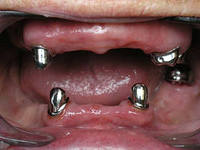 |
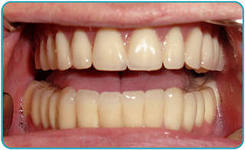 |
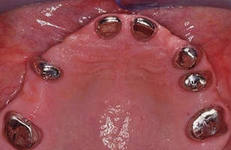 |
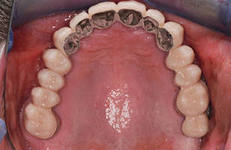 |
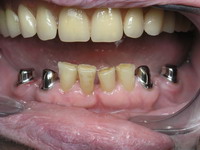 |
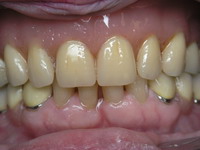 |

